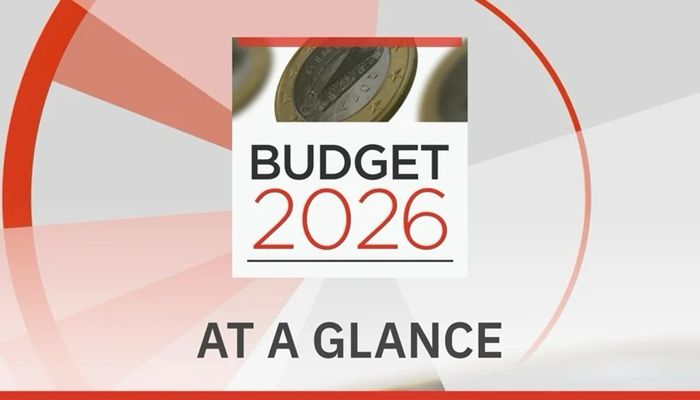By Economic Governance Platform (EGP)
Ghana’s 2026 Budget, themed “𝐑𝐞𝐬𝐞𝐭𝐭𝐢𝐧𝐠 𝐟𝐨𝐫 𝐆𝐫𝐨𝐰𝐭𝐡, 𝐉𝐨𝐛𝐬 𝐚𝐧𝐝 𝐄𝐜𝐨𝐧𝐨𝐦𝐢𝐜 𝐓𝐫𝐚𝐧𝐬𝐟𝐨𝐫𝐦𝐚𝐭𝐢𝐨𝐧” signals a confident shift from stabilization toward rebuilding momentum in the real economy. The fiscal numbers presented by the Minister of Finance show improving fundamentals: GDP projected at 4.8%, inflation expected to fall to 8% on average, public debt declining to GHS 630.2bn, and interest payments trending downwards.
Paired with bold tax reforms, targeted social spending, and strategic infrastructure investments, the budget positions itself as the next phase of Ghana’s economic reset.
Below is EGP’s balanced, evidence-based reading of the budget: the gains, the risks, and the likely impact on households and firms.
𝐖𝐡𝐚𝐭’𝐬 𝐩𝐨𝐬𝐢𝐭𝐢𝐯𝐞 (𝐭𝐡𝐞 “𝐠𝐨𝐨𝐝”)
1. 𝑴𝒂𝒄𝒓𝒐𝒆𝒄𝒐𝒏𝒐𝒎𝒊𝒄 𝒄𝒐𝒏𝒔𝒐𝒍𝒊𝒅𝒂𝒕𝒊𝒐𝒏 𝒂𝒑𝒑𝒆𝒂𝒓𝒔 𝒕𝒐 𝒃𝒆 𝒐𝒏 𝒕𝒓𝒂𝒄𝒌.
Falling public debt and disinflation (projected 8%) signal that the macro reset announced over the last year is yielding results. Lower interest payments free fiscal space for priority spending if the trajectory holds.
2. 𝑹𝒆𝒗𝒆𝒏𝒖𝒆 𝒇𝒐𝒄𝒖𝒔 𝒂𝒏𝒅 𝒕𝒂𝒙 𝒓𝒆𝒇𝒐𝒓𝒎𝒔.
The government’s commitment to deepen domestic resource mobilization and to embark on a comprehensive reform of key tax laws in 2026 is welcome. Raising the VAT registration threshold (GHS 200,000 → GHS 750,000) and lowering the effective VAT rate (21.9% → 20%) are aimed at simplifying administration and reducing compliance burdens for smaller businesses; the package is expected to return GHS 5.7bn to businesses and households – a direct stimulus to activity.
𝟑. 𝐓𝐚𝐫𝐠𝐞𝐭𝐞𝐝 𝐬𝐨𝐜𝐢𝐚𝐥 𝐚𝐧𝐝 𝐡𝐮𝐦𝐚𝐧 𝐜𝐚𝐩𝐢𝐭𝐚𝐥 𝐢𝐧𝐯𝐞𝐬𝐭𝐦𝐞𝐧𝐭𝐬. Allocations for school feeding (GHS 1.98bn), GETFund JHS construction, 200 new JHSs, 2 million mono-desks, upgrading of schools and ”No-fees-stress” demonstrate continuity in protecting social programmes while the economy stabilizes.
4. 𝑬𝒏𝒆𝒓𝒈𝒚 𝒂𝒏𝒅 𝒊𝒏𝒇𝒓𝒂𝒔𝒕𝒓𝒖𝒄𝒕𝒖𝒓𝒆 𝒑𝒖𝒔𝒉.
Plans to add 50 million cubic feet of gas, construct a 1,200 MW power plant, roll out rural electrification and prioritize infrastructure (including major road projects and airport fees for Sunyani Airport rehabilitation) will, if well executed, address chronic supply-side constraints that limit private investment and productivity.
5. 𝑽𝒂𝒍𝒖𝒆 𝒇𝒐𝒓 𝑴𝒐𝒏𝒆𝒚 (𝑽𝒇𝑴) 𝒂𝒏𝒅 𝒈𝒐𝒗𝒆𝒓𝒏𝒂𝒏𝒄𝒆 𝒆𝒎𝒑𝒉𝒂𝒔𝒊𝒔. The establishment of a Value for Money Office projected to save GHS 3bn annually and the emphasis on fiscal discipline, anti-corruption and SOE reforms are crucial to sustain investor confidence and to ensure that fiscal consolidation is not achieved on the back of poor service delivery.
6. 𝑺𝒆𝒄𝒕𝒐𝒓𝒂𝒍 𝒓𝒆𝒔𝒑𝒐𝒏𝒔𝒆𝒔.
The national policy on Oil Palm Development and significant allocations to agriculture (e.g., Nkoko Nkintiki) reinforce the government’s recognition of agriculture’s role as the economy’s heartbeat.
𝐖𝐡𝐚𝐭 𝐭𝐨 𝐛𝐞 𝐜𝐚𝐫𝐞𝐟𝐮𝐥 𝐚𝐛𝐨𝐮𝐭 (𝐫𝐢𝐬𝐤𝐬 & 𝐯𝐮𝐥𝐧𝐞𝐫𝐚𝐛𝐢𝐥𝐢𝐭𝐢𝐞𝐬)
1. 𝑬𝒙𝒆𝒄𝒖𝒕𝒊𝒐𝒏 𝒓𝒊𝒔𝒌 – 𝑪𝑨𝑷𝑬𝑿 𝒖𝒏𝒅𝒆𝒓-𝒆𝒙𝒆𝒄𝒖𝒕𝒊𝒐𝒏.
The budget relies heavily on capital spending to drive growth. Historically, Ghana’s capital expenditure has been vulnerable to cuts and slow execution. The budget’s transformation potential depends on razor-sharp delivery — delays or cuts will undermine growth and job creation claims.
2. 𝑹𝒆𝒗𝒆𝒏𝒖𝒆 𝒗𝒐𝒍𝒂𝒕𝒊𝒍𝒊𝒕𝒚 𝒂𝒏𝒅 𝒕𝒂𝒙 𝒓𝒆𝒇𝒐𝒓𝒎𝒔.
While VAT adjustments and threshold increases reduce administrative burdens, they also carry short-term revenue risks. The government expects to offset this via stronger domestic resource mobilization. Success is not automatic and will require improved tax administration and compliance.
3. 𝑺𝑶𝑬 𝒆𝒙𝒑𝒐𝒔𝒖𝒓𝒆𝒔 𝒓𝒆𝒎𝒂𝒊𝒏 𝒂 𝒄𝒐𝒓𝒆 𝒇𝒓𝒂𝒈𝒊𝒍𝒊𝒕𝒚.
Legacy arrears, tariff under-recovery (notably in the energy sector), and governance weaknesses in state-owned enterprises could erode fiscal gains if not addressed decisively. The commitment to retool the Armed Forces and Fire Service and to resolve IPP legacy debt (GHS 4.8bn allocated) are necessary steps but the structural SOE fixes must be comprehensive.
4. 𝑬𝒙𝒕𝒆𝒓𝒏𝒂𝒍 𝒓𝒊𝒔𝒌𝒔 𝒂𝒏𝒅 𝒄𝒐𝒎𝒎𝒐𝒅𝒊𝒕𝒚 𝒅𝒆𝒑𝒆𝒏𝒅𝒆𝒏𝒄𝒆. Ghana’s macro path remains exposed to external shocks (commodity price swings, gold/cocoa markets) and financing pressures. The planned strategic re-entry into domestic bond markets must be handled carefully to avoid crowding out the private sector.
5. 𝑬𝒍𝒆𝒄𝒕𝒐𝒓𝒂𝒍 𝒂𝒏𝒅 𝒑𝒐𝒍𝒊𝒕𝒊𝒄𝒂𝒍 𝒄𝒚𝒄𝒍𝒆 𝒕𝒆𝒔𝒕𝒊𝒏𝒈.
As S&P cautioned, the effectiveness of reforms will be tested through the economic and electoral cycles. Political pressures could tempt relaxation of fiscal discipline.
6. 𝑫𝒊𝒔𝒕𝒓𝒊𝒃𝒖𝒕𝒊𝒐𝒏𝒂𝒍 𝒊𝒎𝒑𝒂𝒄𝒕.
Abolishing the COVID-19 levy and some VAT changes will benefit households and firms, but the distributional outcomes across income groups must be monitored to ensure the poor are not inadvertently worse off.
𝐋𝐢𝐤𝐞𝐥𝐲 𝐢𝐦𝐩𝐚𝐜𝐭𝐬 𝐨𝐧 𝐭𝐡𝐞 𝐞𝐜𝐨𝐧𝐨𝐦𝐲 & 𝐄𝐆𝐏 𝐩𝐫𝐢𝐨𝐫𝐢𝐭𝐢𝐞𝐬
1. Short-term boost to disposable incomes and small business activity. The VAT threshold increase and lower effective VAT should ease compliance burdens for SMEs and leave more liquidity in the system — potentially supporting consumption and formalization.
2. Improved investor sentiment (conditional). If the fiscal metrics hold and SOE reforms progress, FX and debt markets are likely to respond positively. EGP expects to track FX, local bond yields and sovereign spreads closely in the coming weeks.
3. Potential productivity gains if infrastructure is delivered. Projects such as the Accra–Kumasi expressway (tolled PPP) and new bridges that open agricultural hinterlands can raise growth potential — but only with timely execution and maintenance plans.
4. Room for civil society engagement. EGP and other CSOs should engage proactively on (a) monitoring capital budget execution and VfM outcomes, (b) advocating for transparent tax reform implementation, and (c) tracking SOE governance reforms and IPP liabilities.
𝐑𝐞𝐜𝐨𝐦𝐦𝐞𝐧𝐝𝐚𝐭𝐢𝐨𝐧𝐬
1. Prioritize capital budget execution monitoring. EGP recommends a public dashboard that tracks CAPEX disbursement and project milestones monthly.
2. Support transparent implementation of VAT and tax reforms. Publish expected revenue impacts and transitional support for affected businesses.
3. Fast-track SOE reforms with clear timelines. Publish restructuring plans and conditionality for fiscal support.
4. Protect pro-poor spending. Ring-fence critical social spending and track outcomes (school feeding, JHS construction).
5. Enhance public communication. Regular briefings to markets and citizens on progress and risks to maintain credibility.
𝐂𝐨𝐧𝐜𝐥𝐮𝐬𝐢𝐨𝐧
The 2026 Budget is, by and large, a credible consolidation of recent gains combining macro stabilisation with selective investments in infrastructure and human capital. Yet the budget’s success depends squarely on execution, tighter SOE governance, and sustainable revenue mobilisation. EGP welcomes the direction and will intensify engagements to ensure the promises translate into measurable results for Ghanaian households and businesses.

